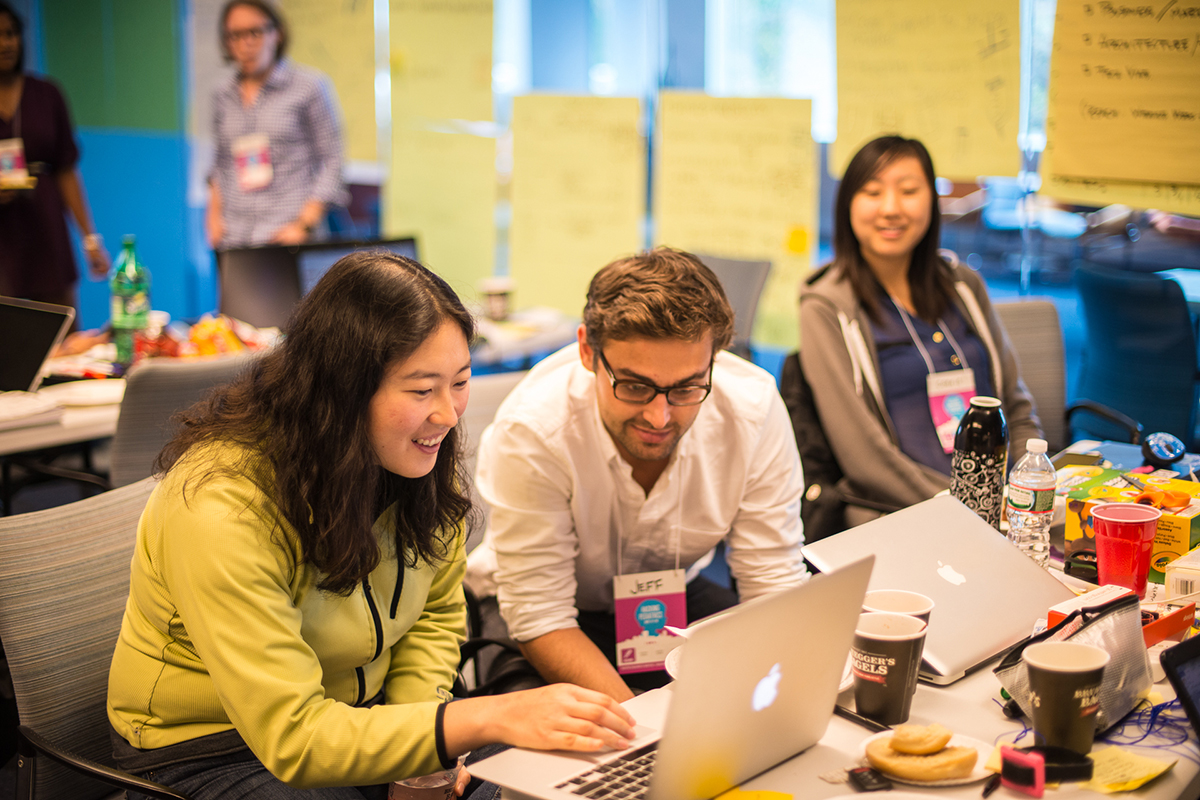Boston Children’s Hosted a Pediatric Hackathon

‘Hackers’ working on their projects. Photo provided by Boston Children’s Hospital
Boston Children’s Hospital hosted its second pediatric hackathon called, “Hacking Pediatrics” in October, which was held at the Microsoft NERD Center in Cambridge. Approximately 125 people participated in 37 pitches on 22 teams.
There was a wide-range of projects pitched including numerous apps. Some standouts included: an app to help with hospital discharge process; creating customized tracheotomy tubes quickly using a 3-D printer; an app to identify common home hazards such as sharp table edges; an app to screen children who may be abused or are in an abusive environment; a platform for determining the correct funding source for vaccines; a mobile phone app that gives incentives to families for vaccinating their children in the third world countries; a device that delivers multiple oral medications to children easily and efficiently; creating a HIPAA compliant electronic clinical task list for providers; an app that uses social media and crowdsourcing to give incentives for positive behavioral changes in adolescents; a wearable pulse oximeter for continuous, discreet monitoring of children; and a wireless and implantable glucose monitor.
“My favorite part was the pitchfest,” says Lauren Tobin, program manager for Hacking Pediatrics. “Seeing the finished products of 24-plus hours of frantic work was amazing. I was so impressed with how much every team accomplished in such a short amount of time. Hearing about new ways of thinking about and solving old problems was really awe-inspiring.”
The winning teams were:
1st place ($3,000): ReadySetGo
ReadySetGo is an interactive solution that answers a question that many people have when leaving a hospital: Now what? The ReadySetGo app provides a “digital roadmap” and resources for parents and the patient’s care team to ensure that the proper care goes beyond the hospital doors.
2nd place ($2,000): Geneticscripts
The Genetiscripts team developed a “pharmacogenomics platform,” which aims to prevent adverse drug reactions in children by informing providers, payers, patients, and their caregivers with the proper information.
3rd place ($1,000): BreatheSMART
The BreatheSMART team developed an add-on device to an asthma inhaler and a corresponding app to passively monitor a patient’s inhaler usage.
“The grand prize winner, team ReadySetGo, also won the MassCONNECT prize,” Tobin says. “MassCONNECT is an early stage mentoring program that connects entrepreneurs to seasoned life sciences professionals in order to catalyze and commercialize innovation. I think with this support and continued support and mentorship from the Hacking Pediatrics team, we can expect big things from team ReadySetGo.”
The other award winners were:
Honorable Mention: PediCare GPS
Project description: A platform and mobile app to help parents build a care map and find local resources for their child.BCH Innovation Acceleration “Springboard” Prize: WhatVax?
Project description: WhatVax will bring clinicians the ability to quickly and accurately determine the correct funding source for vaccines. This will save time for the clinician and funding resources for the hospital.Boston Pediatric Device Consortium Prize: Team Emma
Project description: Team Emma developed an app to safely and accurately monitor oxygen levels without limiting a child’s mobility or interrupting their daily life.Withings Wearable Prize (6 Pulse O2 monitors): CrazyMovz
Project description: An interactive game for children with physical disabilities and injuries.MassConnect Mentorship Prize:
ReadySetGoMailJet Best Implementation Prize:
CrazyMovzTigerText Best Implementation Prize:
BreatheSMART


